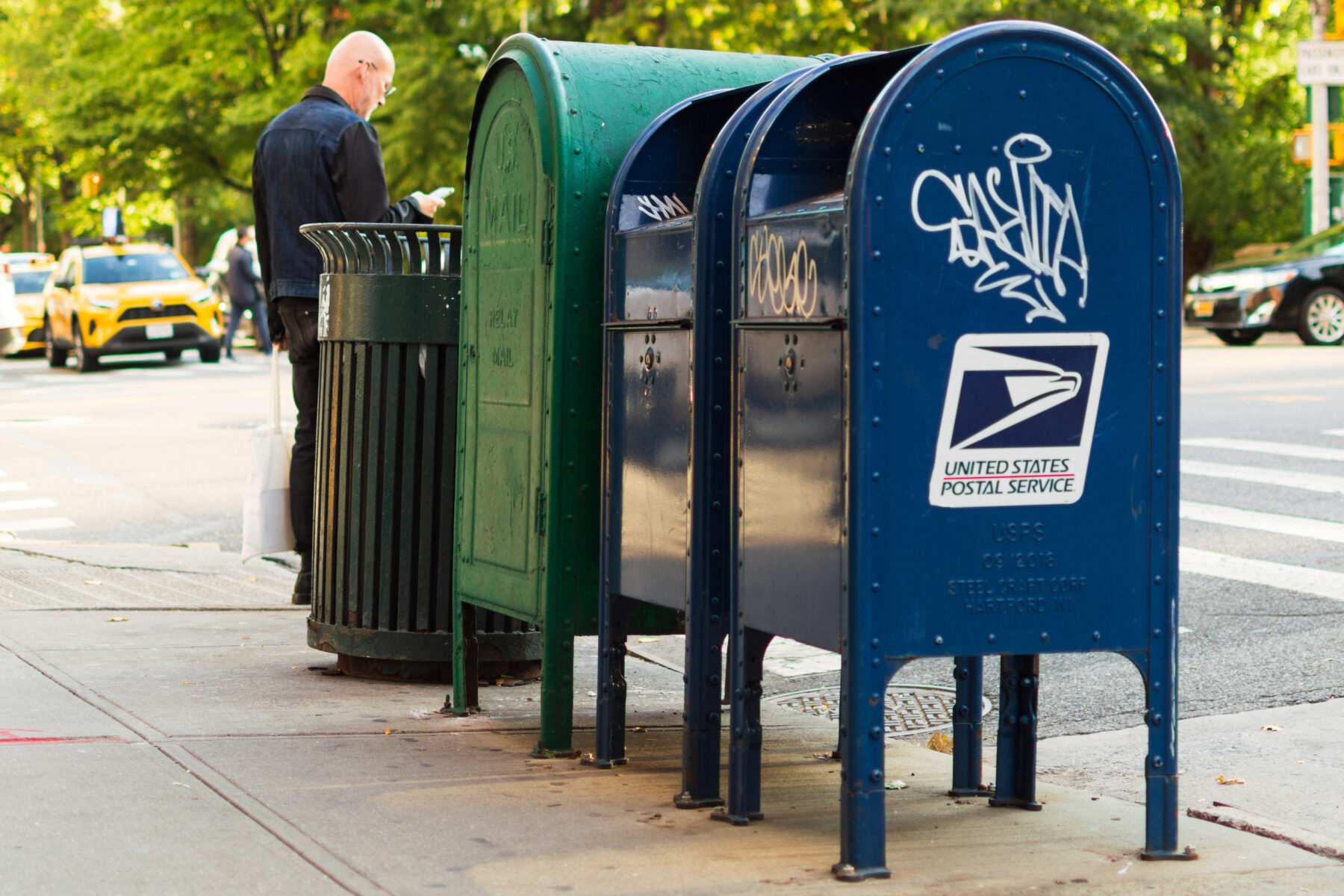
For years, New York Republicans have railed against expansions to mail-in voting.
Now, some in the party say they might not be able to win without it.
“In a place like New York, we’ve come to realize that the only way we’re going to win is if we play by what the rules are,” said Peter Giunta, the chairman of New York State Young Republicans. “Everything from no-excuse mail-in voting to ballot harvesting is legal, so we have to take advantage of the tools and the resources that are out there to help get voters to the polls.”
With just weeks left before election day, several key congressional races in New York could determine control of the U.S. House of Representatives. Democrats have spent years building out their absentee voter turnout operation, and a recent court ruling upholding a law allowing for no-excuse mail-in voting has left Republicans scrambling to adjust their playbook.
After years of messaging that cast doubt on the integrity of mail voting, the GOP now faces the challenge of not only adopting the practice but also convincing voters to accept it. While some in the party believe it could help close critical margins in competitive districts, Democrats remain confident in their established turnout operations, leaving Republicans racing against the clock to see if this strategic shift can make a difference.
It is a dramatic about-face for New York Republicans, who have long fought against expansions to voting methods, particularly mail-in voting.
Just three years ago, the state Republican and Conservative parties led a successful campaign to defeat a series of ballot propositions that would have allowed for same-day voter registration and no-excuse mail-in voting.
Congressman Nick Langworthy (R, NY-23), then the state GOP chairman, labeled these efforts as a “red carpet for fraud” during an October 2021 press conference in Suffolk County, accusing Democrats of using the pandemic to rig the electoral process in their favor.
But no-excuse mail-in voting became the law of the land in New York anyway. In 2023, Albany Democrats pushed through the Early Mail Voter Act, which allows voters to request mail ballots without providing a reason.
Republicans immediately challenged the legislation in court, arguing not only that it was unconstitutional but also that it would burden their campaigns. Multiple affidavits filed in the case by party officials stated the law would force campaigns to shift resources to be competitive with Democratic candidates.
After a year-long legal battle, the state Court of Appeals ruled in August to uphold the law, keeping the provision in place not only for the November election but permanently.
Confronting a new legal reality and the near-guarantee of tight races that might be decided by the slimmest of margins, Republicans have shifted their messaging. Leading Republicans who just months ago were fighting against mail-in voting in court appear to have at least partially come around.
Congresswoman Elise Stefanik (R, NY-21) was the lead plaintiff in the case challenging the Early Mail Voter Act. Now, she is dedicating financial support towards early voting GOP turnout efforts.
For some Republicans, the shift is welcome and affirms earlier efforts that had quietly taken advantage of expanded voting methods.
“We started off the year where the larger party apparatus was skeptical of early voting and mail-in voting,” Giunta said. “Young Republicans, we’ve been a little bit more open-minded to it.”
Giunta said that early and mail voting has become a significant factor in the group’s outreach effort this cycle, particularly for younger candidates backed by their organization.
“We’ve been telling our candidates to make sure that they’re reminding the voters, regardless of age, about early voting and mail-in voting,” Giunta said.
This year, freshman Republican incumbent Mike Lawler (R, NY-17) is facing a tough reelection fight against former congressman Mondaire Jones. Ciro Riccardi, manager of Lawler’s 2024 reelection campaign, says the campaign plans to promote expanded voting methods.
“As one of the earliest Republicans to embrace an aggressive vote-by-mail strategy to secure votes early and often in the voting process,” said Riccardi, “Congressman Lawler hopes that his success will inspire other candidates on the ballot to take the same approach.”
Since the 2020 presidential election, Democrats in New York have consistently outperformed Republicans in mail voting. A Columbia News Service analysis of 13.4 million voter registration records found that in the past two general elections, Democrats have voted by mail at higher rates than Republicans in every one of New York’s congressional districts. It also found that in key races, registered Democrats made up a much larger share of absentee votes compared to Republicans.
But it remains unclear whether increased participation in these voting methods will provide the margin of victory in competitive races. Even with an edge in the early vote, New York Democrats were embarrassingly defeated in several 2022 congressional races that may have been decisive in Republicans winning the House majority.
Former President Donald Trump’s opposition to mail voting has been a key factor in the national debate over election integrity before and since his loss in the 2020 election, which he continues to insist he won.
But in April of this year, as the stakes of the election became clearer, Trump abruptly reversed his message. In a Truth Social post from that month, Trump encouraged his followers to embrace all voting methods, including absentee and early voting.
“ABSENTEE VOTING, EARLY VOTING, AND ELECTION DAY VOTING ARE ALL GOOD OPTIONS,” he wrote. “REPUBLICANS MUST MAKE A PLAN, REGISTER, AND VOTE!”
For a party that has spent years casting doubt on mail voting, Trump’s change in position is essentially a total reversal.
“I think it’s a seismic shift and puts us in a much different position than the [February 2024] special election and probably any of the past two major election cycles,” Giunta said. “I’m happy as a Young Republican to see that the party, our candidates, our nominee for president, is talking about early voting and mail-in voting in a positive way.”
Still, voters on both sides of the aisle remain skeptical of the Republican Party’s promotion of early and mail voting.
Jennifer Colamonico, chairwoman of the Putnam County Democratic Party, doubts this will fundamentally alter the dynamics in tight races.
“I think it’s a lot of the same people who would have voted, just voting more conveniently,” she said. “Republicans seem to be finally coming around to it. To their detriment, they vilified it earlier and so it’ll be interesting to see if it kind of narrows the gap.”
The challenge, experts say, is that mail voting has become highly polarized along party lines. Mara Suttmann-Lea, an assistant professor of government at Connecticut College who specializes in election administration, said that while Republicans have not always opposed mail voting, the party’s more recent rhetoric has undermined trust in the system.
“For the Republican Party, it’s going to involve crafting a get-out-the-vote message that addresses that skepticism,” Suttmann-Lea said. “I think the challenges for the Republican Party are much more acute than they are for the Democratic Party.”
For voters like Dave Mercado, that distrust runs deep. A registered Republican, Mercado lives on Long Island in New York’s fourth congressional district where an upcoming contest between incumbent Republican Anthony D’Esposito and Democrat Lauren Gillen is expected to be close.
Mercado said he is focused on down-ballot races and is not sure if he will vote for president, but when he does vote, it will be in person.
“I’m not a fan of the mail-in votes, obviously, with people stuffing ballots and all that kind of crap,” he said. “I’m voting in person. I make sure I put it in legally, the American way to do it.”
(Photo credit: Alex Klavens)
About the author(s)

Alex Klavens
Alex Klavens is a freelance reporter and an M.S. Candidate at Columbia Journalism School. He is also a Senior Software Engineer at The New York Times.



